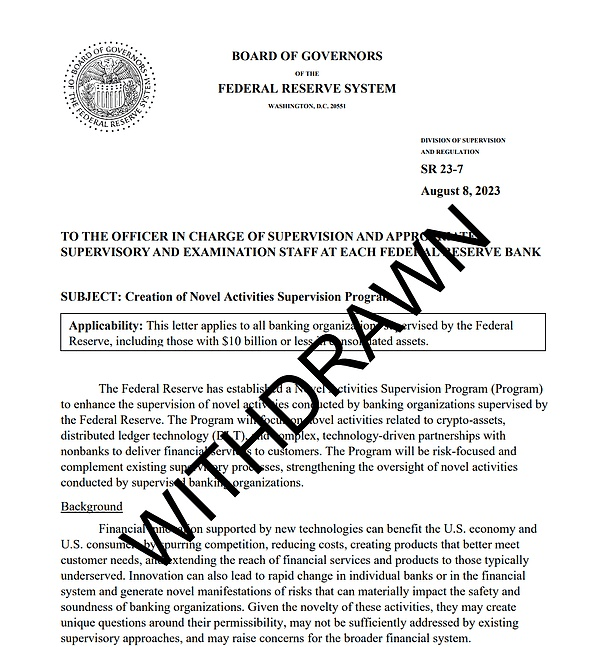Just as the crypto market was still entangled in whether the Federal Reserve would raise interest rates, a bombshell news dropped: the Federal Reserve's crypto special regulatory group, which had been operating for less than two years, was officially announced to be disbanded. This move not only sent the crypto world into a frenzy but was also seen by the industry as a symbolic signal that the direction of U.S. crypto regulation had completely shifted.

Rewind to 2023, when crypto-friendly banks like Silicon Valley Bank and Silvergate Bank faced consecutive crises, and the Federal Reserve urgently launched a "New Activity Supervision Program," placing strict controls on banks' crypto businesses. At that time, the regulatory authority had a very guarded attitude toward cryptocurrencies, and banks had to pass regulatory approval before they could touch crypto businesses. Many institutions directly gave up their plans due to high compliance costs. The crypto industry was full of complaints, accusing regulators of deliberately blocking the connection between traditional finance and the crypto world.
But now the wind has completely changed. The Federal Reserve clearly stated in its announcement: after two years of exploration, it has thoroughly understood the risk points and management logic of crypto business, and there is no need for special regulation; it can be directly included in the daily regulatory framework. This is not simply changing the soup without changing the medicine. In April of this year, the Federal Reserve quietly withdrew the prior approval requirement for banks' crypto businesses, followed by the Office of the Comptroller of the Currency and the Federal Deposit Insurance Corporation easing restrictions, allowing banks to autonomously decide whether to engage in crypto business. In July, the three regulatory agencies jointly issued a document clarifying that banks can compliantly provide crypto custody services, which is equivalent to giving the industry a sense of reassurance.
Behind this wave of regulatory easing is the driving force of political power. With the pro-crypto Trump administration coming to power, the U.S. attitude towards the crypto industry shifted from "blockade" to "reconciliation." But don’t think that regulation will be completely unregulated; core lines such as anti-money laundering and consumer protection have not loosened at all. In simple terms, the current regulatory thinking is "open the door wide, but set thresholds," lowering compliance costs to encourage banks to enter while maintaining risk bottom lines through routine regulation.
For ordinary investors, this means that crypto assets are closer to the "regular army". The entry of banks will bring more standardized crypto financial services, significantly enhancing the security of custody, exchange, and other processes. For the entire industry, the deep participation of traditional financial institutions may attract incremental funds into the market, pushing the crypto market further towards mainstream acceptance.
However, the integration of regulation has just begun. What specific crypto products will banks推出 in the future? Will there be breakthroughs in cross-border crypto payments, crypto loans, and other businesses? These are all worth our continued attention. Do you think the crypto market will experience a new round of explosive growth after banks enter? Let's discuss your views in the comments section, follow me for the first interpretation of the new dynamics in crypto regulation!$ETH $BTC #BNB创新高 #加密市场回调 #杰克逊霍尔会议
